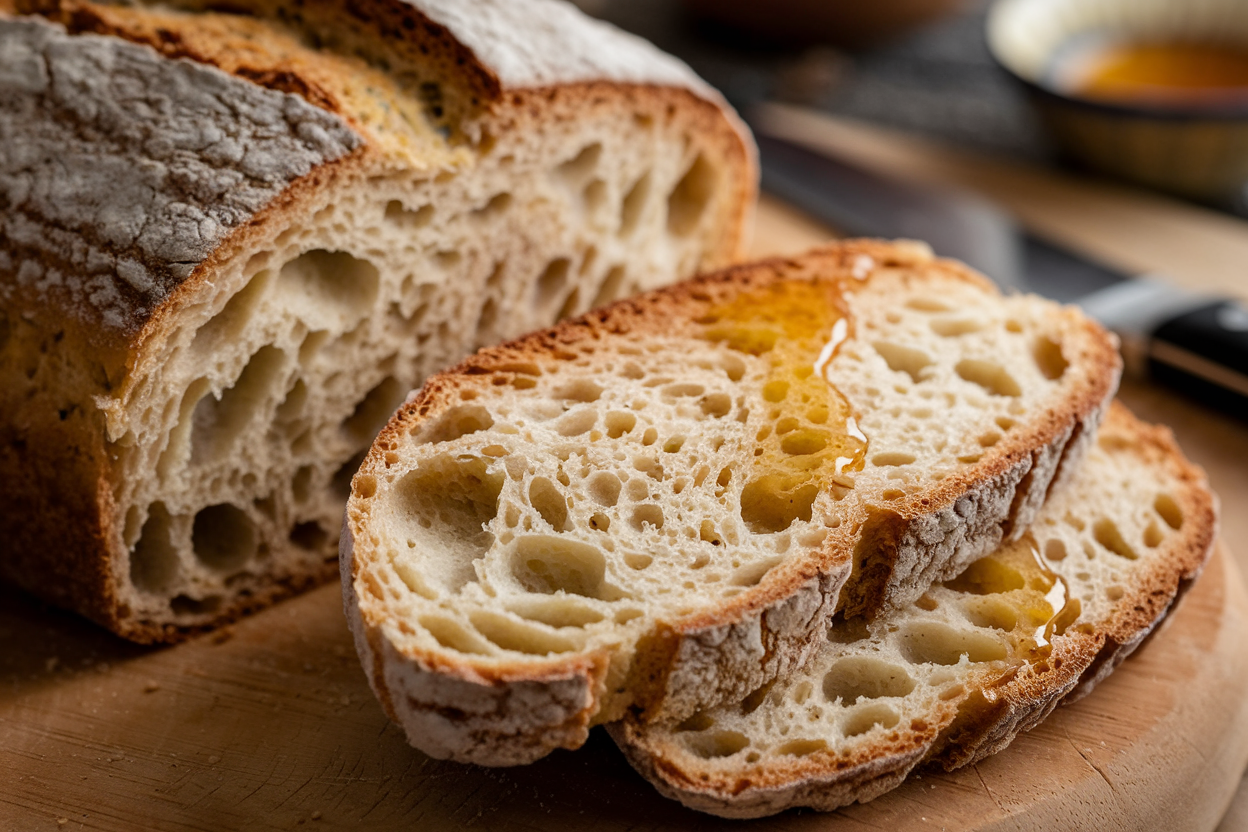The question “Does sourdough bread make good toast?” often sparks curiosity among bread enthusiasts and foodies alike. Sourdough bread, celebrated for its tangy flavor and chewy texture, has become a favorite in kitchens worldwide. From its unique fermentation process to its nutritional benefits, sourdough bread offers an excellent foundation for creating delicious toast.
This article explores why sourdough bread is a top contender for making toast, its unique qualities, and how it stands out in the bread world.
Does Sourdough Bread Make Good Toast? What Makes It Special
Sourdough bread is unlike other breads, and that’s what makes it stand out when toasted. Made using a natural fermentation process, sourdough develops its signature tangy flavor and robust texture. Unlike commercially produced bread, which often contains preservatives and additives, sourdough is all-natural, crafted with care by blending flour, water, and a fermented starter.
Why sourdough excels as toast:
- Natural fermentation enhances flavor and makes the bread easier to digest.
- Its crust becomes crispy and golden, creating the perfect base for toppings.
- The interior stays soft yet structured, providing a delightful texture contrast.
Moreover, sourdough toast is versatile and can be paired with a variety of toppings, from butter and jam to more elaborate combinations like avocado or smoked salmon. For more ideas, explore how it pairs with recipes such as sourdough French toast, a breakfast classic.
Does Sourdough Bread Make Good Toast? The Role of Fermentation
The magic of sourdough lies in its fermentation process. This ancient method of bread-making involves wild yeast and lactic acid bacteria, which work together to leaven the bread naturally. This process not only creates a tangy flavor but also improves the nutritional profile of the bread.
When toasted, sourdough’s fermentation-derived qualities shine. The heat accentuates its sour undertones while enhancing the caramelization of the crust. Each slice becomes a symphony of flavors and textures, making it a superior choice for toast enthusiasts.
For a closer look at bread-making traditions and comparisons, visit this resource to understand bread-based recipes.
Does Sourdough Bread Make Good Toast? Unraveling the Flavor
One of the main reasons sourdough bread is ideal for toast is its flavor. Toasting enhances its tangy and slightly sweet notes, creating a rich and balanced taste. This complex flavor makes sourdough an excellent base for both sweet and savory toppings.
What makes sourdough flavor stand out?
- Fermentation adds depth: The wild yeast and bacteria used in sourdough production create subtle sour and nutty notes.
- Caramelization during toasting: Heat brings out natural sugars, adding a layer of sweetness.
- Natural ingredients: Unlike commercial bread, sourdough doesn’t rely on additives for flavor.
Because of this complexity, sourdough toast stands out on its own or as part of a complete meal. For more inspiration on using sourdough in creative dishes, check out breakfast bread tips.
Does Sourdough Bread Make Good Toast? Textural Perfection
When it comes to toast, texture matters as much as flavor, and sourdough doesn’t disappoint. Its sturdy crust transforms into a crisp, golden surface when toasted, while its airy crumb retains a pleasant chewiness. This combination of crisp and soft textures makes each bite of sourdough toast a delight.
Key textural benefits:
- Crisp crust: Offers a satisfying crunch.
- Soft crumb: Maintains chewiness without falling apart.
- Sturdiness: Holds up well under heavy or moist toppings.
For example, sourdough can easily support rich toppings like avocado or cream cheese without becoming soggy. This makes it a practical and enjoyable choice for breakfast, lunch, or dinner.
Does Sourdough Bread Make Good Toast? Nutritional Benefits
Sourdough bread offers more than just great taste—it also comes with several nutritional advantages. Its fermentation process breaks down gluten, making it easier to digest, and improves the bioavailability of key nutrients like magnesium, zinc, and B vitamins.
Nutritional highlights of sourdough toast:
- Low glycemic index: Helps stabilize blood sugar levels.
- Probiotics: Supports gut health thanks to natural fermentation.
- Minimal ingredients: Free from unnecessary preservatives or additives.
This makes sourdough toast a health-conscious choice, perfect for those looking to enjoy their food without compromising on nutrition.
Does Sourdough Bread Make Good Toast? Creative Toppings to Try
Sourdough toast is a blank canvas that allows for endless creativity. Whether you prefer something simple or enjoy experimenting with gourmet toppings, sourdough provides a solid base.
Sweet topping suggestions:
- Honey with ricotta cheese.
- Fresh fruit slices and a drizzle of maple syrup.
- Nut butter with a sprinkle of chia seeds.
Savory topping ideas:
- Avocado and poached egg.
- Smoked salmon with dill and cream cheese.
- Hummus topped with roasted vegetables.
The bread’s tangy undertones elevate the flavor of both sweet and savory combinations. For a twist, try incorporating sourdough toast into recipes like sourdough French toast.
Does Sourdough Bread Make Good Toast? Toasting Techniques
Getting the perfect slice of sourdough toast requires a bit of technique. Here are some tips to ensure your toast comes out just right:
- Slice thickness: Aim for ½-inch slices for even toasting.
- Preheat your toaster: Ensures consistent browning and texture.
- Timing matters: Watch closely, as sourdough’s natural sugars can brown quickly.
- Brush with oil or butter: For an extra golden and crisp finish.
These simple steps will enhance your toasting experience and help you make the most of your sourdough bread.
Does Sourdough Bread Make Good Toast? Comparisons with Other Breads
While many breads can be toasted, few rival sourdough in terms of flavor and texture. Let’s compare sourdough with other popular options:
- White bread: Lacks the depth of flavor and texture found in sourdough.
- Whole grain bread: Nutritious but often denser, leading to less crisp toast.
- Rye bread: Offers bold flavor but can overpower delicate toppings.
Sourdough strikes a balance between taste, texture, and versatility, making it the ideal bread for toasting.
Does Sourdough Bread Make Good Toast? A Culinary Favorite
Sourdough toast has become a staple in gourmet kitchens and trendy cafes. Its versatility allows chefs and home cooks to use it in various dishes beyond simple toast.
Common culinary uses:
- Open-faced sandwiches.
- Crostini served with dips and spreads.
- Toasted cubes as croutons in soups and salads.
By incorporating sourdough toast into your meals, you can add sophistication and flavor to your dishes.
Does Sourdough Bread Make Good Toast? Environmental Impact
Choosing sourdough bread is not only a culinary choice but also an environmentally conscious one. Traditional sourdough production involves minimal processing and often supports local bakers and small-scale producers.
Sustainability benefits:
- Often made with organic, locally sourced ingredients.
- Long shelf life reduces food waste.
- Free from chemical additives or artificial preservatives.
By opting for sourdough bread, you’re making a mindful choice that aligns with sustainable food practices.
Does Sourdough Bread Make Good Toast? The Final Verdict
To answer the question “does sourdough bread make good toast?”, the evidence is clear. From its rich flavor and satisfying texture to its nutritional benefits and environmental sustainability, sourdough bread is an outstanding choice for toast lovers.

